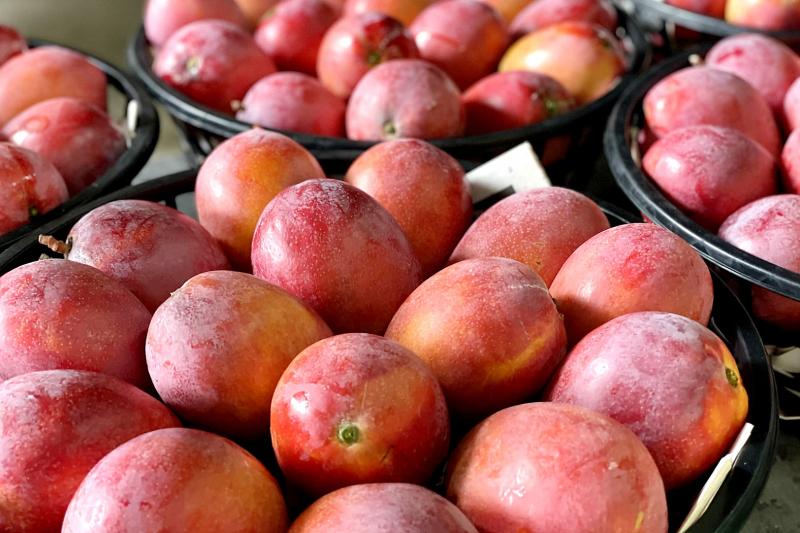Macau on Saturday placed a ban on mango imports from a Taiwanese company after traces of the COVID-19 virus were allegedly detected in a shipment, the second such ban in two days.
The Macau Municipal Affairs Bureau placed a one-week suspension on the unnamed company’s imports after samples collected from external packaging of its products allegedly tested positive for the nucleic acid of SARS-CoV-2.
The batches of mangoes from which the samples were collected have been destroyed, the bureau said, adding that the ban is “aimed at protecting Macau residents instead of targeting specific countries or regions.”

Photo: CNA
However, there is “currently no evidence that people can catch COVID-19 from food, including fruits and vegetables,” the WHO said. “Fresh fruits and vegetables are part of a healthy diet and their consumption should be encouraged.”
The same protocol was also applied to food imports from other countries and regions, such as Argentina, Poland, Vietnam, Indonesia and Hong Kong, whose products were found to contain traces of the COVID-19 virus as well, the bureau said.
Traces of the COVID-19 virus on Wednesday were allegedly found on samples of mangoes imported from another Taiwanese company, with a one-week ban on that firm’s products taking effect on Friday.
However, the Council of Agriculture said on Friday that they had not been notified of the suspension from Macau authorities.
The council urged Macau to handle such matters professionally, particularly given the lack of evidence that COVID-19 can be transmitted via packaged produce.
Macau should follow proper risk control protocols that comply with international standards to ensure unfettered trade, it added.
The council said that China had imposed COVID-19-related restrictions on international trade with many countries during the pandemic and should provide scientific data to support its measures.
A number of countries have raised concerns about China’s import restrictions during meetings of the WTO Sanitary and Phytosanitary Measures Committee, it said.
For instance, the US, the EU, Canada and India have been voicing their concerns over the issue since November 2020, it said.

Nipah virus infection is to be officially listed as a category 5 notifiable infectious disease in Taiwan in March, while clinical treatment guidelines are being formulated, the Centers for Disease Control (CDC) said yesterday. With Nipah infections being reported in other countries and considering its relatively high fatality rate, the centers on Jan. 16 announced that it would be listed as a notifiable infectious disease to bolster the nation’s systematic early warning system and increase public awareness, the CDC said. Bangladesh reported four fatal cases last year in separate districts, with three linked to raw date palm sap consumption, CDC Epidemic Intelligence

The manufacture of the remaining 28 M1A2T Abrams tanks Taiwan purchased from the US has recently been completed, and they are expected to be delivered within the next one to two months, a source said yesterday. The Ministry of National Defense is arranging cargo ships to transport the tanks to Taiwan as soon as possible, said the source, who is familiar with the matter. The estimated arrival time ranges from late this month to early next month, the source said. The 28 Abrams tanks make up the third and final batch of a total of 108 tanks, valued at about NT$40.5 billion

Two Taiwanese prosecutors were questioned by Chinese security personnel at their hotel during a trip to China’s Henan Province this month, the Mainland Affairs Council (MAC) said yesterday. The officers had personal information on the prosecutors, including “when they were assigned to their posts, their work locations and job titles,” MAC Deputy Minister and spokesman Liang Wen-chieh (梁文傑) said. On top of asking about their agencies and positions, the officers also questioned the prosecutors about the Cross-Strait Joint Crime-Fighting and Judicial Mutual Assistance Agreement, a pact that serves as the framework for Taiwan-China cooperation on combating crime and providing judicial assistance, Liang

A group from the Taiwanese Designers in Australia association yesterday represented Taiwan at the Midsumma Pride March in Melbourne. The march, held in the St. Kilda suburb, is the city’s largest LGBTQIA+ parade and the flagship event of the annual Midsumma Festival. It attracted more than 45,000 spectators who supported the 400 groups and 10,000 marchers that participated this year, the association said. Taiwanese Designers said they organized a team to march for Taiwan this year, joining politicians, government agencies, professionals and community organizations in showing support for LGBTQIA+ people and diverse communities. As the first country in Asia to legalize same-sex